By Rabbi Ilana C. Garber
What was one of the holiest moments in your life? I remember my wedding day: standing under the chupah with my beloved, participating in the rituals of the wedding ceremony that I had performed as a rabbi so many times – this time, celebrating as the bride. I remember gazing into his eyes, seeing our future, sensing our love, and feeling the support and love of our gathered family and friends. It was truly one of the holiest moments of my life.
Holy, in Hebrew kadosh, also means sanctified, special, set apart, or even unique. Our relationships – with parents, children, some friends, and, most especially, our life’s partner – can certainly be holy, if we work on those relationships to maintain their holiness. Standing under the chupah is only the beginning; fostering holiness in a relationship can and should take a lifetime.
In Parshat Kedoshim, we read the Hebrew words kedoshim tehiyu, you shall be holy. We might understand this to teach us that we are holy, but more importantly, I would like to suggest that it teaches us that we can become holy – if we work on it. We must become holy. We must always strive to find that beautiful holiness in our lives and in our relationships.
We have experienced that holiness with God – the Exodus from Egypt, receiving the 10 Commandments, etc. – and we continue to experience it as Jews engaged in relationship with God each and every Shabbat, for instance. Through our relationship with God we feel a special connection. So too in our personal relationships: to be holy as a couple, exclusive one to the other, is to show the world that you are special. We are each unique and sanctified for the other.
Our community’s holiest possession is the mikveh, the ritual bath, that enables us to maintain our holy relationships. A mikveh is so necessary to a community that the rabbis taught we may even sell a Torah scroll if it will help to fund the mikveh. After all, the mikveh is where Jews-by-choice immerse in the welcoming waters of our tradition as they become Jews, and the mikveh is where women (and some men) seek renewal and readiness as part of the practices of family purity. Without the mikveh, we would simply not be able to make more Jews!
Thus if we want to be a holy people, if we want to be holy individuals, and if we want to be in holy relationships, our community mikveh is truly our holiest possession. When I read Parshat Kedoshim, which speaks of all of the very important ways that we can be, must be, and will be holy, such as rising before the elderly, honoring our parents, and loving the stranger, I feel compelled to remind us all of the holiness that comes from this sacred act of immersion in mayim hayim, living waters. Mikveh is our source of hope for the future. Mikveh is for those seeking renewal, sanctification, or something incredibly special. Mikveh is where holiness is born.
Kedoshim tehiyu, you shall be holy. Shabbat Shalom.
The Greater Hartford Community Mikveh Bess Israel will celebrate an Open House and Dedication on Sunday, May 4th, from 3-5. Everyone is invited to see the renovations and to tour the mikveh, 61 North Main Street, West Hartford. For more information, visit www.bessisrael.org or call 860-521-9946.
Rabbi Ilana C. Garber is spiritual leader of Beth El Temple in West Hartford.







 Southern New England Jewish Ledger
Southern New England Jewish Ledger












